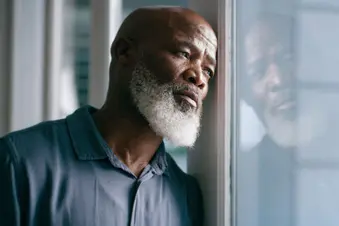
The research is clear: Prostate cancer significantly impacts Black men.
It’s the most common cancer found in men of African descent. One in 6 in the U.S. will develop the disease. In fact, African American men’s risk is 70% higher than the risk in other racial and ethnic groups. They’re also more likely to be diagnosed with advanced prostate cancer.
But why is this the case? Socioeconomic factors and biological risk are two reasons. Disparities in health care are another. These disparities appear to play a key role in how early prostate cancer is diagnosed and how Black men are treated after diagnosis, often leading to worse outcomes. Let’s take a closer look.
Prostate Cancer Screenings: Too Little, Too Late
In 2012, the U.S. Preventive Services Task Force published guidelines advising against prostate-specific antigen (PSA) screening for prostate cancer in all men. They changed again in 2017, recommending that men between the ages of 55 and 69 decide for themselves if screening is necessary.
But screening guidelines have historically been based on studies that included very few African American men. The Prostate Cancer Foundation recently updated its guidelines in an attempt to address these concerns. They now recommend that Black men talk to their doctor about getting screened once they turn 40.
Mistrust and Lack of Information
The two most common screening tools are a PSA test and a digital rectal exam (DRE). But some men think DREs are the only option, so they put it off or avoid screening entirely. Some are nervous or embarrassed about a doctor checking their rectum, not knowing that a simple blood test could be the first step.
Other barriers to screening include fears of the unknown and concerns about how it might impact their masculinity. But when prostate cancer is caught early, it’s highly treatable. The five-year survival rate is 99%. That’s the percentage of people still alive five years after diagnosis. And screenings don’t affect sexual function. Treatment might, but that’s down the road if you’re diagnosed. Even then, there are ways to correct erectile dysfunction.
There’s also a lack of confidence in the medical system. Exploratory surgeries on enslaved women and the Tuskegee experiments are just two examples of long-standing racism in health care and the mistreatment that occurs.
Socioeconomic Factors
Your financial situation and where you live may also play a role. Living in a disadvantaged neighborhood often leads to worse outcomes for African American men with prostate cancer. You’re more likely to be diagnosed later, and you may not get the treatment you need.
A recent study linked the surrounding environment to higher prostate cancer risk in Black men. Those in underprivileged neighborhoods were more at risk than Black men living in affluent areas. Researchers think this may be because of ongoing stressors such as:
- Violence
- Housing discrimination
- Racial profiling
It’s thought that this ongoing stress affects the immune system, triggering higher levels of inflammation, which may fuel tumor growth.
Genetic Factors
Prostate cancers in men of African descent are biologically distinct from those in men of other races. These differences include:
- Genetic mutations (changes in genes)
- Protein variations
- An altered tumor microenvironment (the normal cells, molecules, and blood vessels that surround and feed a tumor cell)
Underrepresentation in Research
Only 6.7% of people in clinical trials that test new therapies for prostate cancer are Black men. But it’s hard to know how new drugs might benefit them if they aren’t participating.
One of the reasons for this lack of participation is medical mistrust, which we mentioned earlier. Some men don’t believe researchers will fully explain the pros and cons of taking part in research, such as potential negative side effects.
Simple lack of awareness is another. But even when someone knows about a trial and wants to take part, certain things may make it more difficult. One example is living in rural areas far from major medical centers, which is where most clinical trials are done.
The good news is that the FDA and the National Institutes of Health now require drug companies to work harder to get underrepresented populations to take part in clinical trials. Funding and drug approval may be harder to secure if these conditions aren’t met.
The Prostate Cancer Foundation and National Cancer Institute recently launched a study focused on learning more about the things that increase Black men’s risk. Called RESPOND (Research on Prostate Cancer in Men of African Ancestry: Defining the Roles of Genetics, Tumor Markers and Social Stress) the study aims to recruit 10,000 Black men with prostate cancer.
Visit respondstudy.org for more information. To learn more about other clinical trials for prostate cancer, visit the Prostate Cancer Foundation’s website.
Show Sources
Photo Credit: iStock/Getty Images
SOURCES:
Cancer: “Racial disparities in Black men with prostate cancer: A literature review.”
Public Library of Science: “Men’s perspectives of prostate cancer screening: A systematic review of qualitative studies.”
American Cancer Society: “American Cancer Society Recommendations for Prostate Cancer Early Detection,” “American Cancer Society survey of nearly 1,200 men aged 45+ in the U.S. reveals gaps in awareness and misconceptions of prostate cancer screening guidelines.”
American Cancer Society Cancer Action Network: “Prostate Cancer and Black Men.”
Hollings Cancer Center: “New Hollings study reveals barriers, presents solutions to improve prostate cancer screening among Black men.”
University of Southern California Keck School of Medicine: “Don’t Be Afraid of the Prostate Exam.”
Memorial Sloan Kettering Cancer Center: “Why Black Men Should Consider Earlier Screening for Prostate Cancer.”
National Institutes of Health: “NIH study links neighborhood environment to prostate cancer risk in men with West African genetic ancestry.”
Prostate Cancer Foundation: “Know Your Risk.”
Zero Prostate Cancer: “Black Men’s Prostate Cancer Initiative.”
Harvard Medical School: “Embracing Diversity: The Imperative for Inclusive Clinical Trials.”
University of Michigan School of Public Health: “Understanding Black Distrust of Medicine.”